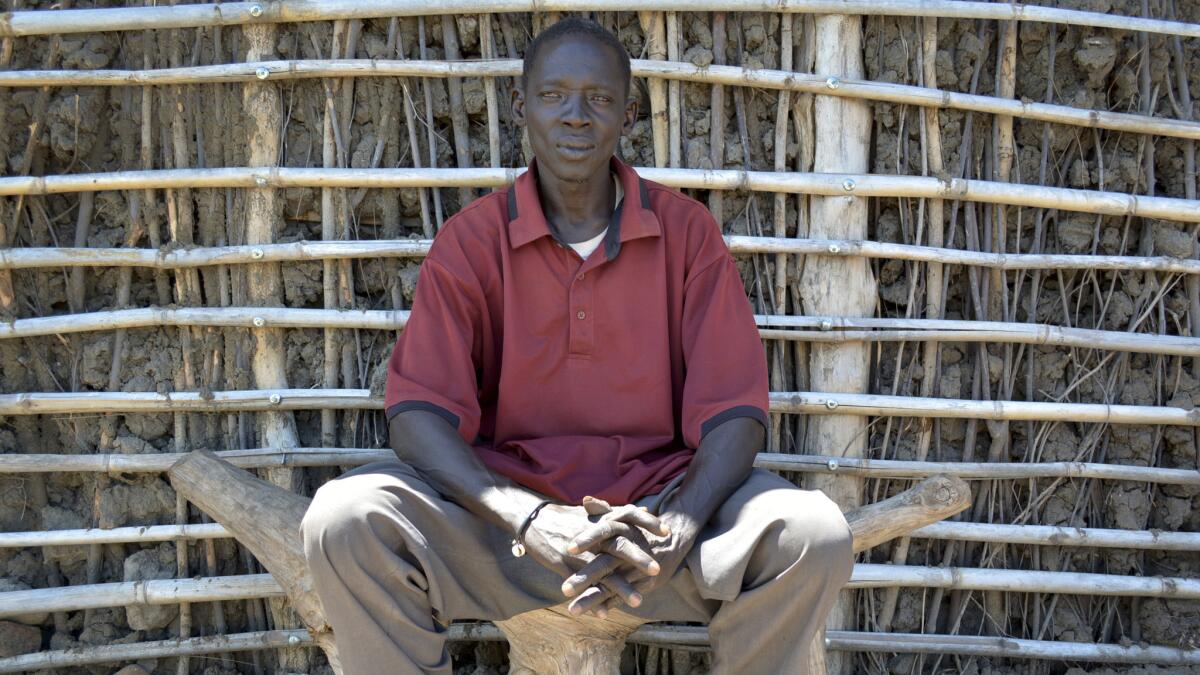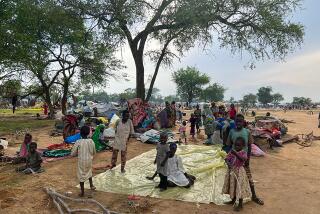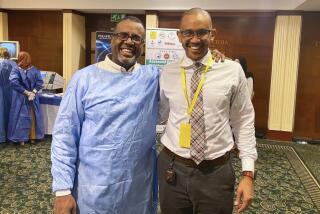To understand life in rural South Sudan, talk to this man about his cattle
Reporting from Terekeka, South Sudan — The possessions in Luko Loku’s thatched home convey his simple life. A bedside stool with a sliver of mirror. An old door hinge. A machete lying on the bed frame, as if sleeping.
His clothes dangle from a wire, his motorcycle leans against one wall. There’s a hammer, a scattering of plastic cups, a water barrel and little else. But he does have riches, and his wealth is outside, wandering on 2,000 legs — his 500 cattle, making him one of the big men in his neighborhood.
This herder from the Mundari tribe lives in the quiet South Sudan town of Terekeka on the Nile River, and his lifestyle has endured for centuries. To understand the ebb and flow of life here — the ancient traditions and the modern threats — talk to Loku and he will tell you of his cattle.
He has no idea of his age. He has no education, no radio and no television and never reads. He does not own a gun or a mobile phone.

His fortunes revolve around his graceful long-horn cattle, and his two favorite bulls, Selimbe (meaning “welcome”) and Mamoro (meaning “united”).
The bravest of his herd is a pale grey cow, Lewa.
“She is the one in charge of the cattle,” Loku says. “She is the brave one who always goes in front.”
His big herd has brought him fame in his town. To Loku, every good thing that ever happened came from his herd, including his three wives and 21 children. His life’s mission is to increase his herd, with the obsessive hunger of a Wall Street trader chasing the next deal.
“I know all my cows, every one. I love them all, because they are all my cows. I have favorites, but I love them all,” Loku says. He demonstrates the kissing noise he makes to call his cows to follow him home in the evening.
Sometimes the bulls Selimbe and Mamoro fight. When that happens, he laughs like a fond father, and separates them.
His cattle, lumbering beasts with grey hides and towering horns, are the center of his life, not only because they bring a family food and wealth, but because they are at the heart of every important ceremony. To marry, men in South Sudan’s herding communities pay the girl’s father a bride price in dozens of cows.
“I use these cattle to feed my family and take care of them,” says Loku.
“We use the cows for marriage,” he adds. “That’s why they’re important. We slaughter a bull when a visitor comes. We drink the blood or cook with the blood. For weddings, we slaughter four bulls. We slaughter bulls when someone dies. If a man has many cattle, the family slaughters five or six or seven bulls when he dies.”
When Loku was a boy, his father didn’t allow him to go to school, but sent him to the cattle camp. As a boy, he and other herders speared a lion to death that was threatening their livestock.
“I’m glad there are no lions left now,” he says, approvingly.
The life of a cattle boy, even today, is extremely harsh. They spend their days walking naked with the cattle, often in broiling heat. They live at night in the cattle camp. They get no schooling. A small boy on the road to Terekeka conveys the hardship in his face: nursing a sickly lamb in his arms, he squints into the sun, as he walks along the road barefoot.
In return for Loku’s years of sacrifice, he was given 35 cattle from his father when his younger sisters were married off. He gradually built up his herd to 180 beasts. He was ready to marry a girl called Achan, after his father and her father agreed on a price after a long negotiation.
“I loved her. When you love a girl you tell her. She was very funny, always laughing. She was tall and very beautiful.”
Four days before Loku was due to send the cows to Achan’s father, gunfire rang out as he slept in the cattle camp with three other herders, guarding a 5,000-strong herd.
“They had guns and we only had spears,” he recalls. “We had to hide, just to survive. I never saw my enemy. I didn’t even know who they were. But they took all the cattle.”
With no cows to pay, the marriage fell through.
“That was the worst thing that happened in my life,” he says. “I went into my house and I cried for a week. I felt terrible. You just sit there and feel sorrowful. I was afraid I would never get married because they took all my cattle. As a man, if you don’t get married you really feel ashamed. You’re supposed to get married and have children.
“If you don’t have cattle, you can’t get married. People will say, ‘Why don’t you have cattle?’ People will say, ‘You are not a man.’”
For a time, Loku went into farming. Then he got 20 cows from the marriage of his fourth sister, and started again.
He married his first wife who is “hard-working and obedient” for 40 cows, his second for 40 cows and his third for 30 cows.
“Now I have 500 cattle,” he smiles proudly.
With sons off tending the cattle, he sits outside his home on a low wooden stool, in a narrow band of shade. He wears a worn leather bracelet with one faded shell and when he smiles, he flashes a silver tooth and gapped front teeth.
Terekeka consists of not much more than one main dirt road, with tracks snaking off into dusty neighborhoods, where people live in traditional houses of mud, sticks and thatch. Goats amble, chickens peck and children dash around with wire wheels they push along using sticks. A woman sits under a tree holding a plastic bottle of milk, with a mangy dog at her feet and a toddler in a frilly dress tottering around.
Most mornings Loku rises early and takes his cattle into the bush to graze. At dusk, he brings them back to camp by the Nile. Several tall poles, painted black and white, each topped with flapping rag flags and a set of bull horns, mark the camp’s location.
Each year, Loku takes the cattle far into the bush for three months, sleeping under a shelter with a cowhide roof.
The constants in a South Sudan herder’s life haven’t changed much in generations. Among those are the givens, that the man is boss in the family, and expects total obedience from his wives. “They always obey me. If one of my wives doesn’t want to obey me, she can go home.”
Loku is proud that his 12 sons won’t have the problem that he had marrying. He has so many cows he can easily pay for brides for all of them.
But there’s also the fear that his fortune could be wiped out overnight. Armed cattle raiders from rival tribes can sweep in at any time. Loku’s long thin spear is no match for the AK-47s raiders carry these days.
In recent years a new threat has emerged, a cattle illness Loku had never seen.
“Their necks and eyes swell up and in two days, they’re dead,” he says, miming a dying cow, closing his eyes and flopping his head to one side. “I’m worried for my cows. I don’t know what to do. In two days, 20 of my cows died.”
South Sudan has as many cattle as people, more than 11 million, but the country’s civil war from 2013-15 forced herders to move their cattle far south into areas normally avoided because of the risk of disease. Several virulent cattle diseases, including hemorrhagic septicemia and East Coast fever, once rarely seen in South Sudan, have spread, according to Abdal Osman, cattle expert with the U.N.’s Food and Agriculture Organization.
The threats Loku faces are terrifying but they only make him determined to gather more cattle to join Selimbe, Mamoro and the ever-bold Lewa.
“I’ll take care of my 21 children,” he says. “I’m thinking to get richer. My only thought is to get more cattle, so that whatever I need, I can get very easily.
“I need as many cows as possible. There’s no limit. When I come to see them, I just want there to be more and more and more. I want as many cattle as I can get.”
This story was reported with the support of a fellowship from the International Women’s Media Foundation.
Twitter: @RobynDixon_LAT
ALSO
More companies commit to equal pay pledge on Women’s Equality Day
U.S. intelligence sees Islamic State as weakened after series of defeats
The war in Syria was already complicated. Now a border skirmish is adding a new level of intrigue
More to Read
Sign up for Essential California
The most important California stories and recommendations in your inbox every morning.
You may occasionally receive promotional content from the Los Angeles Times.










